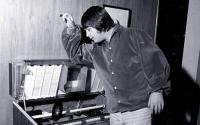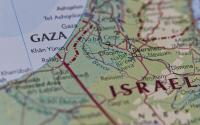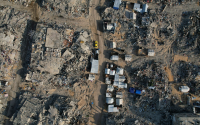Homes Wrecked, Lives Destroyed: Israeli Tactics That Fuel the Intifada
Common Dreams / Published on Wednesday, May 19, 2004 by the lndependent/UKDonald Macintyre in Gaza
Israel was accused yesterday of committing a war crime by its destruction of more than 3,000 Palestinian homes in Israel and the occupied territories since the intifada began three and a half years ago.
The damning report from Amnesty International came as the Israeli army killed up to 19 Palestinians - children as well as militants - in the Rafah refugee camp in the Gaza Strip where General Moshe Ya'alon, the army chief of staff, warned at the weekend that hundreds more homes could be destroyed.
In its critique of the Israeli policy of destroying buildings and "vast areas" of agricultural land, the report challenges head-on the argument that the destruction is militarily necessary. It also warns that "punitive forced evictions and house demolitions" are a "flagrant form of collective punishment" that "violate a fundamental principle of international law".
The report was published as a heavily armored Israeli force moved into the Tel Sultan district of the Rafah camp yesterday, in one of Israel's biggest incursions into Gaza. The attack followed an assault by helicopter gunships which had earlier killed seven Palestinians - at least three of them gunmen - outside a mosque.
As soldiers mounted a house-to-house hunt for militants, the town's hospital was filled with 40 Palestinians wounded by missile attacks and Israeli sniper fire. The local hospital morgue became so overloaded that five bodies had to be shifted to vegetable freezers in a nearby market.
Earlier, troops had fanned out under cover of darkness into the neighborhood in the early hours of the morning, seizing vantage points amid two missile attacks before dawn. With Rafah sealed off from the rest of Gaza by the army, at least 45 military vehicles moved into the camp, including tanks and armored bulldozers. At least 88 houses were destroyed in the camp last week, making more than 1,000 people homeless.
Since the intifada began in September 2000, 2,806 Palestinians and 921 Israelis.
Asmaa Mughayer, 15, and her brother Ahmed, 13, were shot dead yesterday as they fed pigeons on the roof of their house. Their uncle, Mahmoud Mughayer, said that they had been unaware of the extent of the incursion because with the camp's electricity supply cut off by the assault there was no television. Their elder brother, Ali, 24, had shouted at them to come down because it was dangerous. When he heard no response, he climbed the steps to find his sister and brother lying dead in a pool of blood.
Mr Mughayer said: "The snipers fired at him, too. He lay on the ground, and slowly crept pulling them one after another to the third floor." He added that it had taken an ambulance five hours to arrive because of the firing. He added: "This was the biggest crime. Asmaa and Ahmed were not mujahedin. This is the largest injustice, unacceptable by humanity."
Palestinian sources said that the army had destroyed four houses belonging to dead militants and taken over another four houses. They added that at dawn a helicopter spotted a number of militants near the Bilal Ben Rabah mosque and had fired a rocket, killing a militant from Hamas who was identified as Hani Qifeh. Shortly afterwards, the same helicopter fired again, killing two brothers and a third man, the sources said. Missiles also burnt a library in the mosque.
Witnesses said that armored bulldozers had brought down electric cables and telephone lines. "We are afraid," said Miriam Abu Jazzar, outside her daughter's home, apparently wrecked by a missile. "Every hour there is shooting."
The army insisted that the operation was aimed at militants who it says smuggle weapons through tunnels from Egypt to Rafah. General Ya'alon said: "Rafah has become a gateway for terror through which rocket-propelled grenades and other weapons have passed. After we tried to persuade the Palestinian authorities to stop this activity, we were forced to prevent this ourselves. If they [the Palestinians] want to prevent house demolitions, they must stop the arms smuggling."
President George Bush called the Gaza bloodshed "troubling" but told the powerful pro-Israel lobby group Aipac that Israel "has every right to defend itself from terror". A White House spokesman said it was in touch with the Israelis about the humanitarian impact of their incursion but had been assured the goal was to stymie smuggling, not level homes.
Despite earlier suggestions that the army intended to demolish more homes - after at least 88 were destroyed in the camp last week in the wake of an attack on an Israeli troop carrier that killed five soldiers - it denied that the operation was a prelude to a massive widening of the Philapdelphi patrol road between Gaza and the Egyptian border. While the present status of that plan is still unclear, such widening would require a demolition on the scale that had been envisaged by Gen Ya'alon last week.
The greatest burden of house destruction has fallen on Gaza, with more than 2,200 demolitions in the past three-and-a-half years, and Rafah the worst afflicted area. The Amnesty report suggests that a high proportion of demolitions is purely punitive and that such "collective punishment", including destruction of homes of families of suicide bombers, is against international law.
Amnesty challenges the military justification for the destruction, much of which it says is "inextricably linked" to its policy of land appropriation, not least for "establishing Israeli settlements in violation of international law". The report also points out that Article 147 of the Fourth Geneva Convention states that "extensive destruction and appropriation of property not justified by military necessity and carried out unlawfully" is a "grave breach and hence a war crime".
Donatella Rovera, a co-author of the report, said that "in the vast majority of cases" the demolitions represented "wanton destruction". She added: "It's unnecessary, disproportionate, unjustified and deliberate." Reacting to the report, the Israeli Foreign Ministry said Palestinian militants used houses in civilian neighborhoods to attack Israeli forces, and that made the structures "legitimate military targets" under international law.
Although most of the criticism is reserved for Israel, the report says the Palestinian Authority should take "all possible measures" to prevent attacks by militants against Israeli civilians - and to ensure that such groups do not initiate "armed confrontations from residential civilian areas".
The Foreign Ministry said - in reference to demolitions in Rafah - that houses are used to cover entrances to weapons-smuggling tunnels. "The demolition of these structures is often the only way to combat this threat."
The core of Amnesty's argument is that while some destructions may be militarily necessary within the meaning of international law many are not and that Israel's use of the military defense is "extremely broad". It goes on to say: "In the case of long-held occupied territory over which the occupying power exercises effective control military needs must be read extremely narrowly."
Lawful military purposes do not, for example, include appropriation for the "expansion and consolidation of Israeli settlements in occupied territory".
LIVING UNDER OCCUPATION
For four years, Khalil Bashir, a school principal, his wife Souad, their six children and his mother have been under pressure from the Israeli army to leave their home near the Israeli settlement of Kfar Darom in the Gaza strip.
In October 2000, Israeli soldiers took over the upper floors of their house. Since then, the Bashir family have been confined to the ground floor, while the top floor has been turned into an army base accessed by a ladder.
Even though the Israeli army has full control of the house, soldiers have opened fire on the house from a watchtower. The sides of the house are riddled with bullets and the ground floor rooms facing the army position have sustained extensive damage.
Three members of the Bashir family have been injured by Israeli army fire. On 13 October 2000, Mr Bashir's son Yazen, 17, was shot and injured in the leg while he was getting water. On 28 April, 2001 soldiers shot from the watchtower into Mr Bashir's bedroom while he was reading, injuring him in the back of the head and neck.
On 18 February 2004 Israeli soldiers shot and seriously injured Mr Bashir's son Yusuf, 15. At the time Yusuf was outside the house with his father seeing off visitors, including two United Nations staff members. The three visitors had just got into their vehicle, clearly marked with the UN emblem, and were about to leave when a single shot was fired from the Israeli watchtower. Yusuf was hit in the back by a bullet. He is still in hospital and it is not known if he will walk again.
Shortly afterwards, his sister Amira, 18, told Amnesty International: "I am worried for my brother. I don't know if he will walk again; and I am worried about my three little siblings, my parents and my grandmother. I pray that they will be safe. The home should be the safest place but for our family it is not."






